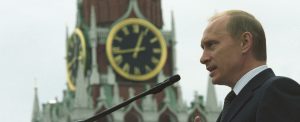The anti-declinist political syndrome is now at its most lethal in Russia, Britain and Italy – with predictably self-destructive results.
Patrick Cockburn is the author of War in the Age of Trump (Verso)
Cross-posted from Counterpunch

Countries in decline are dangerous and unpredictable beasts. They may produce leaders who attempt to reverse the process by some adventurous action that has not been tried before. This usually turns out to be far riskier than they imagined, but they cannot retreat as their own political existence is now at stake.
The anti-declinist political syndrome is now at its most lethal in Russia, Britain and Italy – with predictably self-destructive results. By far the most calamitous attempt at national revival was that by Vladimir Putin, when he invaded Ukraine on 24 February, in the fixed belief that his armies would face no resistance.
In a more minor key, Liz Truss and Kwasi Kwarteng claimed to be jump-starting a national revival with their radical mini-Budget on 23 September, only to see it blow up in their face. Two days later, Italians voted for a quasi-fascist government likely to blame immigrants, “LGBT+ lobbyists” and trade unions, among others, for causing Italy’s troubles.
Those pretending to reverse national weakness in practice usually speed it up by selling spurious formulas promising rejuvenation. Countries that might have successfully managed their relative decline for decades fast-track the process by showing themselves to be even more dysfunctional than hostile critics had suspected.
Putin’s huge mistake
Russia is the greatest example. A war in Ukraine that was meant to restore Russia to the superpower status once held by the Soviet Union has done the exact opposite. Russia will be far less of a power after the Ukraine conflict than it was before.
Some of its biggest failings remain inexplicable. Russia was supposed to possess a powerful air force. Tens of billions of dollars were spent by the US and Nato on vastly expensive aircraft to combat this threat. But the Russian air force has largely failed to appear over Ukraine. It has only lost about 55 fixed-wing aircraft so far, according to the Brussels-based International Crisis Group.
The scale of the debacle of the Russian military effort is extraordinary, nor is there any sign of it ending. Far too few troops were sent by Moscow to fight in Ukraine. When the Ukrainian armed forces launched their counter-offensive around Kharkiv in September, they faced only non-regular Russian units which panicked and fled, abandoning their vehicles and equipment. Putin then introduced partial conscription for 300,000 new recruits, a complicated operation that Russia had not practised for years. In the event, local authorities simply press-ganged whoever they could get their hands on and sent them on to the military.
The recruits who stayed get a winter uniform, a weapon and up to a month of training. This compares to the 12 weeks of training that Russian conscripts used to receive before the Ukraine war. It means that freshly mobilised troops will only be capable of manning checkpoints and performing other non-combat duties. If these largely untrained men are put into combat units, then the effectiveness of these will be degraded.
This inability by the Russian state to raise its game militarily is significant because it has had plenty of time to do so. Russia may remain a nuclear super-power, but by every other measure it will revert to being one of the larger powers in Europe, weaker than at any time since Peter the Great defeated the Swedish army at Poltava in Ukraine in 1709.
Anything approaching a defeat for Russia will not be welcomed by everybody because it is not only China and India that want to avoid the total primacy of the United States – as happened after the break-up of the Soviet Union in 1991. Opec powers like Saudi Arabia want to keep their ability to manoeuvre, something they may lose in a unipolar world run by America.
Almost nobody knows what he is doing or why
Putin exaggerated Russia’s strength and underestimated Ukraine, along with its Nato allies. He decided to invade Ukraine, disregarding advice to the contrary by military and diplomatic experts, who were reportedly later aghast when they learned what he had done. Since then his openness to counter-arguments and advice from within the Russian elite has diminished even further, with almost nobody knowing what he is doing or why.
Western pundits are derisive or contemptuous of Putin’s isolation from real expertise, but this is characteristic of leaders in Britain and Italy, who likewise claim to be reversing national decline. Politicians selling snake oil are unlikely to welcome the views of anybody who knows a lot about snakes or oil. But the greatest danger comes from leaders like Putin who believe their own propaganda.
Silvio Berlusconi and Boris Johnson were similar in their rhetoric and ambitious projects, such as giant bridges, but seldom did much about either. Truss, on the other hand, was willing to get rid of senior mandarins like Sir Tom Scholar for potentially hobbling her growth agenda, always about as realistic as Mao Zedong’s Great Leap Forward.
The anti-decline programme
A problem facing leaders with an anti-decline programme is that the challenges facing their countries are usually too complicated and deep-rooted for much to be done about them. They take refuge in scapegoating everybody from immigrants to the International Monetary Fund, as appears likely to happen with the incoming Italian government.
As prime minister, Giorgia Meloni will have to hold together a rancorous coalition of parties. Though Italian and British politics increasingly resemble each other, the difference is that in Britain factions are within a party rather than outside it.
Russia, Britain and Italy may differ in the extent of their decline, but none has thrown up leaders capable of dealing with it. Bad though cynical opportunists like Johnson and Berlusconi are, they may be less dangerous than Putin – and perhaps Truss – who suffer from a tunnel vision that is not so different from plain stupidity.
The leaders of nations with ebbing power and economic performance paradoxically fail to take on board that these failings are an excellent reason for not rocking the boat. Military conflicts and sudden shocks should be avoided.
Putin is doing poorly in Ukraine, but then the US and UK did not do much better in Iraq and Afghanistan. National decline is seldom as bad as it looks – until somebody attempts to reverse it.
Further thoughts
I was living in Belfast writing my PhD at Queen’s University when I first visited America in 1972. At that time Northern Ireland was one of the more violent places on the planet, aside from conventional war zones like Vietnam. But I was surprised in New York to find that people talked more, and even seemed more frightened, of violence than back in Belfast. I once asked eight or so people I was having dinner with if they had personally been the victim of or witness to an act of violence over the previous year. One hand went up, showing the huge gap between the perception of the threat of violence and actual violence as recorded in government data.
Nothing has changed much in the following half century, going by the run-up to the US mid-term elections in November. Fox News is focusing on violent crime so great swathes of people believe it is rising sharply when in fact it has been going steadily down.
The USA Department of Justice has published figures showing that between 1993 and 2021 the proportion of people who were the victim of some type of violence fell from 79.8 to 16.5 per 1,000. The violence includes rape or sexual assault, robbery, aggravated assault and simple assault. In the decade between 2012 and 2021, the figures fell from 26.1 to 16.5 per 1,000. In 2021 about 0.98 per cent of the US population (2.7 million) over 12 years of age experienced violent crime.
Support us and become part of a media that takes responsibility for society
BRAVE NEW EUROPE is a not-for-profit educational platform for economics, politics, and climate change that brings authors at the cutting edge of progressive thought together with activists and others with articles like this. If you would like to support our work and want to see more writing free of state or corporate media bias and free of charge. To maintain the impetus and impartiality we need fresh funds every month. Three hundred donors, giving £5 or 5 euros a month would bring us close to £1,500 monthly, which is enough to keep us going.




Be the first to comment